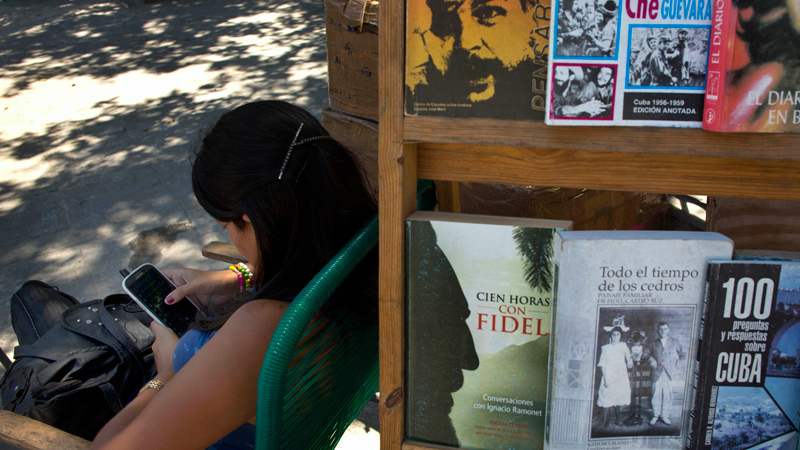
In this April 1, 2014, photo, a book street vendor passes the time on her smart phone as she waits for customers in Havana, Cuba. The administrator of the U.S. Agency for International Development on Tuesday begins a series of appearances Tuesday, April 8, 2014, before lawmakers asking questions about his agency’s secret “Cuban Twitter,” a social media network built to stir unrest in the communist island. First up in the questioning of administrator Rajiv Shah is Sen. Patrick Leahy, D-Vt., who publicly called the social media program “dumb, dumb, dumb.” (AP Photo/Ramon Espinosa)
• Senator calls program “dumb, dumb, dumb”
• Agency head denies it was a covert operation
• Lawyer for detained American accuse USAID of endangering client
WASHINGTON — The administrator of the U.S. Agency for International Development on Tuesday is beginning a series of appearances before lawmakers asking questions about his agency’s secret “Cuban Twitter,” a social media network built to stir unrest in the communist island.
First up in the questioning of administrator Rajiv Shah is Sen. Patrick Leahy, D-Vt., who publicly called the social media program “dumb, dumb, dumb.”
Last week, an Associated Press investigation revealed that USAID oversaw the creation of the text message-based service, dubbed ZunZuneo for the sound made by a Cuban hummingbird. USAID and its contractors went to extensive lengths to conceal Washington’s ties to the project, according to interviews and documents obtained by the AP.
A key question for the hearings will be whether the program endangered its users by concealing that the U.S. government was behind the program. The network was publicly launched shortly after the 2009 arrest in Cuba of American contractor Alan Gross. He was imprisoned there after traveling repeatedly on a separate, clandestine USAID mission to expand Cuban Internet access using sensitive technology that only governments use.
Early Tuesday, Gross’ lawyer released a statement that his client was going on a hunger strike. The ZunZuneo story was “one of the factors” Gross took into account in connection with his hunger strike, the attorney said.
“Once Alan was arrested, it is shocking that USAID would imperil his safety even further by running a covert operation in Cuba,” said the lawyer, Scott Gilbert. “USAID has made one absurdly bad decision after another.”
Lawmakers will also try to determine whether the program should have been classified as “covert” under U.S. national security law, which requires covert action to be authorized by the president and briefed to congressional intelligence committees.
Shah said last week that the ZunZuneo program was not covert, though “parts of it were done discreetly” to protect the people involved. He said on MSNBC that a study by the Government Accountability Office into democracy promotion programs run by USAID and the State Department — including the Cuban Twitter project — found the programs to be consistent with the law.
“This is simply not a covert effort in any regard,” he said.
But the author of the GAO study, David Gootnick, told the AP this week that investigators did not examine the question of whether the programs were covert.
Gootnick said the GAO’s report was focused on examining the extent that USAID knew what its contractors were doing. It found that the agency was adequately monitoring the work.
“We did not ask, nor did we report, on the wisdom of conducting such activities,” he said.
Leahy, who oversees the Senate Appropriations subcommittee that authorizes spending for USAID and the State Department, said he was not aware of the Cuban Twitter project while it was in operation.
“If I had been, I would have said, ‘What in heaven’s name are you thinking?'” he said on MSNBC last week. “If you’re going to do a covert operation like this for a regime change, assuming it ever makes any sense, it’s not something that should be done through USAID.”
In addition to Leahy’s committee, Shah is expected to appear before a Republican-chaired House Appropriations subcommittee, as well as the House and Senate foreign relations committees. Last week, the Republican chairman of a House oversight panel said it would be looking into the project.
In a blog posted Monday, USAID reiterated its position that the program was not covert, challenging the AP’s story on several fronts. It said references to the use of “smart mobs” in documents obtained by the AP “had nothing to do with Cuba nor ZunZuneo,” though the two are clearly referenced.
The agency also said that several CEO candidates for the network’s company were told explicitly that the U.S. government was involved. Documents showed that the creators of ZunZuneo wanted to keep the origins of the service secret from CEO candidates. The AP contacted two of the candidates, both of whom said they’d interviewed for the job with no idea of U.S. involvement.
RELATED STORIES
White House defends ‘Cuban Twitter’ to stir unrest
US secretly built ‘Cuban Twitter’ to stir unrest